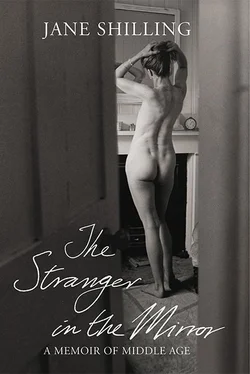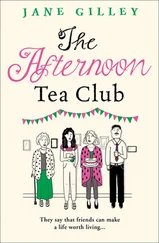I arrived at 29 and 39 and the end of my forties with the flustered, disorderly sense of someone embarking on a journey who hasn’t allowed enough time to pack. It couldn’t be time to move on already. I’d only just settled into 20, 30 or 40: arranged the rooms as I liked them, got on terms with the neighbours, understood the routines, the argot and the complicated dress codes of the district, learned about the movement of the tides and the direction of the prevailing wind, found out which were the best places to pick up a bargain or hear the latest news – when suddenly there was the voice of the station announcer bawling that the train was standing at the platform, it was time to embark, get on, get on now, please, stand away from the doors, the train is ready to depart. And with a lurch and a rattle one was off again on the next leg of the journey.
Growing older is not, of course, a purely private matter. Other people are keen to encourage you to keep up, if it looks as though you might be dawdling on the way. In my early thirties, a younger woman asked me whether I wanted eventually to marry and have children and, when I said that I did, gave me an assessing look and said, ‘Then hadn’t you better get on with it?’ Some years later, having got on with having a child (though not with getting married), I fell into conversation at a party with the wife of a well-known novelist, who had just been on a long journey of self-discovery to India. ‘I’ve always wanted to visit India,’ said I, artlessly. ‘When I’m middle-aged and my son is off my hands, I really want to go.’
‘But Jane,’ said the novelist’s literary agent, looming behind me, ‘you are middle-aged.’ I looked at him, with his grey hair and patrician manner, and at the novelist’s wife, who was, perhaps, fifteen years older than I, with her graceful, wrinkled elegance, her air of bony fragility and her ethnic draperies, and I thought, sensing my flesh still firm around me, my sense of my own allure still as intact as it had ever been, that he didn’t know what he was talking about.
It is easier than you might think to ignore the passage of time if you have an untroubled relationship with your corporeal person. Time etches everyone’s life story on their bodies, but my history, until my fall, had been quite lightly carved. I suffered a single broken collarbone in my early twenties. Soon afterwards, both my retinas became detached after a trivial accident. A sudden darkness eclipsed my vision as I sat gazing idly out of the office window one dull Wednesday afternoon.
There followed an ambulance, a half-frightening, half-comic consultation with a gathering throng of interested doctors, an emergency operation, a strange but not unpleasant period of fugue involving a fuzzy alliance of heavy anaesthesia, blindness and atropine drops. And then the peculiar decompression of a patient who emerges from a period in hospital to find that nothing has changed; the world has been going on as normal all the time that she has been sequestered from it. All that narrative, and not a syllable of it left written on the body.
A decade later there came the unexpected baby. ‘You know that your stomach will hang down in folds like ruched blinds after you’ve had this baby?’ threatened the (male) GP whom I visited in the early stages – apparently driven to make this dire prediction by fury at the fact that I proposed to go through with an unplanned pregnancy and bring up the resulting child alone.
(The urgent desire of the medical profession to impose order on the capricious, messy and mysterious terrain that is the female reproductive system is a fascinating subject, to which we will return. The tidying-up instinct is not confined to male doctors. Discussing contraception in my forties with a young woman GP, I rejected her suggestion of an implant. ‘But it’s a very safe method,’ she protested. ‘You’ll be virtually sterilised.’
I tried to explain that that was exactly why I wasn’t interested. That although it would be extremely inconvenient to become pregnant at this stage of my life, and although I was keen to take steps to avoid it, I nevertheless felt, on some primitive level, the need for a faint, residual trace of ambiguity; the vaguest of possibilities that some particularly intrepid sperm might navigate the contraceptive obstacle course. The expression of incomprehension and contempt on her face as I tried to explain this was very striking. We settled on the low-dose Pill.)
As the pregnancy progressed, I began to think that Dr Ruched Blinds might have had a point. In the blithe haze of fertile detachment that muffled even the most urgent anxieties about what life might be like when this baby was born (where would we live? How? And on what?) I found myself curiously unworried about what my centre-front panel might look like once the baby was out from under it, although it did strike me that some of the changes that I had undergone might not be entirely reversible.
The everted navel, for example: was that really going to shrink modestly back into the tidy dimple it had once been? What about the sinister unknitting of the bony bonds of the pelvic girdle which, seeking an explanation for the stabbing pains in my hip joints, I had read about in a rare, unwise excursion into one of the pregnancy books that I shunned for their patronising tone and grisly illustrations? My loosened skeleton could be relied on to put itself back together, post-partum, as good as new, could it? Or might I find that I had begun to creak and rattle at the joints, like an old chair that someone too heavy has sat on?
When my son was born I was taken aback by the jellied mass of puckered flesh that was my deflated belly. When I sat down, it settled in my lap like a small, amorphous pet. It crept over the waistband of my jeans, pale and tender as a puffball. It was a striking change from the taut concavity that used to occupy the space between my hip bones. But in the shower one day a few weeks after the birth I looked down and the puffball had gone. The arc between my hip bones was now slightly convex, rather than concave, but smooth, unjellied, unpuckered.
‘I’ve repaired myself as if by magic,’ wrote Colette exultantly to a friend, after giving birth to her only child, a daughter, at 40. Magic was exactly what it seemed like – the restoration, after such a strenuous and deforming adventure, of the body to its accustomed shape as mysterious and improbable as the springing buds on dead-seeming twigs at winter’s end. I considered making an appointment with the doom-mongering GP, just for the pleasure of whipping up my vest and showing him my unruched frontage, but found that I didn’t care about him any more.
Apart from accident, illness or the stigmata of pregnancy, the other mark that time leaves on the body is the loss of beauty. For the very beautiful, the process begins horribly early. ‘I’ve lost my bloom,’ said a friend one day when we had barely turned 24. I was still hoping to grow into my looks, and said with asperity that it seemed a bit soon for the dying fall, at which the friend (whose extreme cleverness gave her beauty – pale translucent skin, grey eyes with black eyelashes, waving chestnut hair and a fine, straight nose – an almost moral force, like one of Shakespeare’s more serious-minded and enigmatic heroines, so that beside her I often felt not merely plainer and dimmer, but less virtuous as well), patiently explained the difference between mere looks, which we all have when young, more or less, and bloom, the luminous quality that lends some girls and very young women a mythic, almost archaic air of unconscious self-possession, driving men and modelling scouts into frenzies of acquisitive desire.
Painful though it is to acknowledge that one will never know what it feels like to possess the authority that beauty lends, there are certain consolations: ‘You are so fortunate not to be a beauty,’ says the exquisite homosexual, Cedric, to his wholesome-looking confidante, Fanny, in Nancy Mitford’s novel, Love in a Cold Climate . ‘You’ll never know the agony of losing your looks…’
Читать дальше












